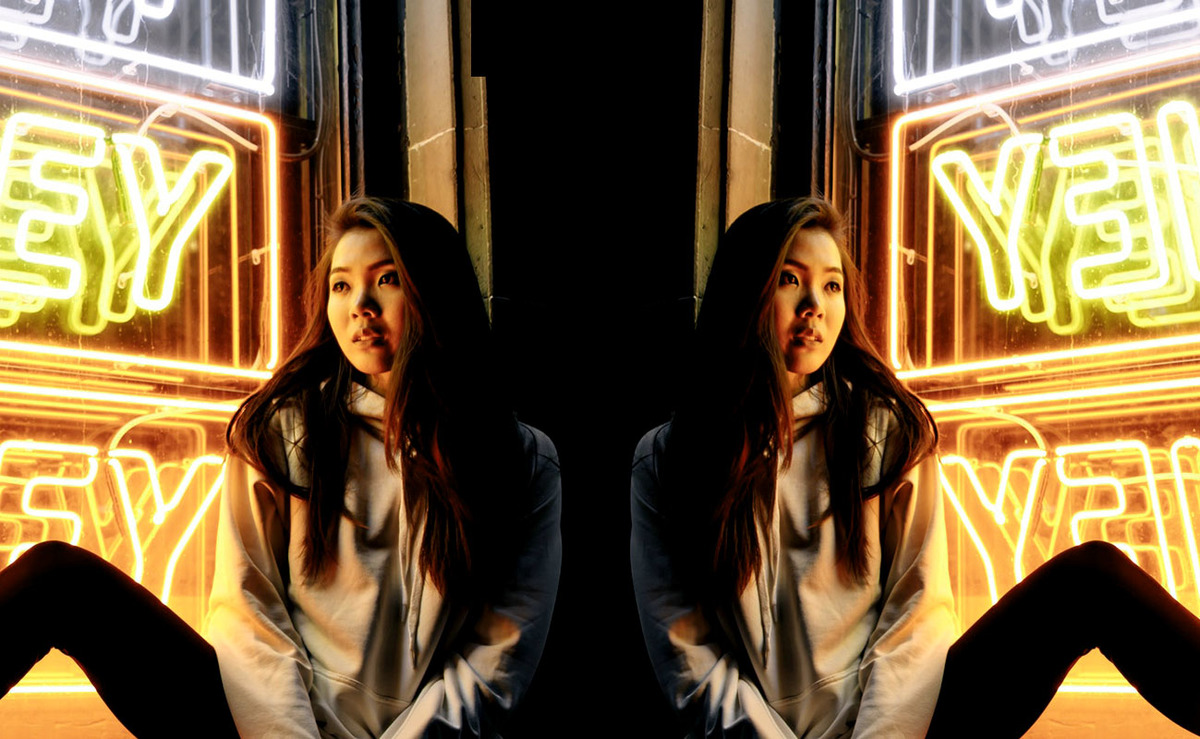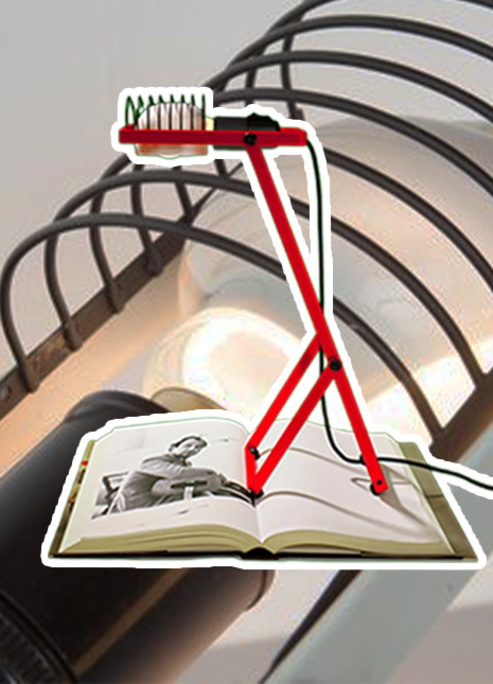I Went Blind To A Feminist Self-Defense Class
Keen to kick further into feminism, I signed up with no idea what to expect.
I arrive characteristically flustered to a 16-floor building somewhere in West Berlin. I'm in foreign territory. Entering the foyer, I scan hurriedly for a vague location named Between Us – was this the name of the place or a soft stipulation of discretion? Instead of a labeled buzzer, I'm met only by generic notices written in both German and Arabic. I feel as if I have unwittingly stumbled into some kind of embassy; this doesn't look like the venue of an English-speaking feminist self-defense class, although having to inquire as to its whereabouts to the keen ears and wry smirks of all five male security guards already has me feeling a little defensive.
I ascend to the top floor and arrive to an open-plan room which we are later told is a pop-up library and cultural meeting place for asylum shelter families and the public, with multi-purpose furniture built by the students themselves. In typical Berlin fashion, most of the girls are smoking and making small talk on the balcony. I introduce myself to the wrong woman before being pointed in the direction of Palestinian class instructor Majd to make yet another awkward introduction – honestly, in this exclusively female setting, I'm feeling way outside of my comfort zone.
She asks if I'd like to change my mini skirt for something more practical and, quickly clocking onto the ubiquitous jeans, leggings and harem pants, I start feeling mildly concerned about what exactly this class is going to entail. I didn't get to see the introductory email so, refraining from any further questions, I keep my skirt on anyway and sit nervously on a chair for all of about two minutes, making halfhearted and very English comments about the sunny Sunday afternoon weather and the spectacular panoramic views before we are ushered inside and offered ice-cold lemon water in charming plastic tumblers.

We all grab a cushion on the floor and, to my relief, the class doesn't begin with the dreaded tell-us-some-facts-about-yourself introductory scenario – seriously, you have to be a fucking sadist if you think this is a “great icebreaker.” Instead, we are asked to write our names and preferred pronoun onto some improvised sticky tape name badges and take turns reading it out loud to confirm our gender preference. The participants are a melting pot of ages and nationalities – all enthusiastic and eager to contribute to the discussion – and as Majd roughly outlines the structure of the class, she reassures us that we may freely opt out of any part if we don't feel the vibe, simply by saying “no.” For the next few hours, this was to be our safe space.
Majd has been instructing for four years. Coming from a male-dominated culture where religion shapes social behavior, her interest in self-defense was a reaction to huge gender inequality and the regular harassment of women on the streets. After traveling around the world and listening to many different stories, she trained in Stockholm before returning to share her skills in Palestine. Now, through her self-defense classes and participation in feminist workshops, she is on a mission to spread justice and equality wherever she goes by giving women the power to fight back.
The first discussion centers around the different types of violence: physical, emotional, psychological, sexual and so on – but most importantly, domestic. Majd recalls the UN Women statistic that a staggering one in three women experience physical or sexual violence, mostly by an intimate partner. I'm instantly broken out of my half-skepticism about the class by the realization that I could very likely be sitting among previous or even current victims of any of these forms of abuse.
I'm pretty new to the concept of feminism, having only recently developed an interest as I age and begin to care more about my place in the world. I've been blissfully ignorant for most of my 25 years, in fact. I have, of course, been on the receiving end of sexism – whether it was weird comments from the old-timer boss at my old job, uncomfortable objectification in the club or the classic “smile” catcalls from construction workers – but I had never really taken the time to register these things as harassment or identify as a victim, and I have been privileged enough not to be subjected to anything worse. As a freelancer living in perpetual skintness, the pay gap and workplace discrimination have never really crossed my mind, either. And none of this ignorance has been helped by my allergic reaction to the word, “sisterhood,” and frankly most women in general, as someone with about 1.4 female friends and one too many insecurities. Yep, I bombed straight into the deep end with this one.

Up on our feet, Majd reads out some threatening scenarios and assigns a corner of the room for each of our potential responses, including an “other” corner which would form the basis for some very useful points of group discussion. The scenarios include a group of intimidating men standing in the street on your way home, uninvited sexual moves on the dance floor and a friend asking for advice after experiencing physical abuse from her partner. Perhaps the most dividing scenario, however, involves OTT manspreading on public transport: would you move somewhere else, tell the man to respect your personal space or sit it out until he hopefully left the train?
One of the girls raises a few eyebrows when she suggests this behavior could simply be the man's way of expressing his attraction and unconsciously releasing pheromones from his nether regions to unwittingly meet your nose (anyone else battling with some horrendous mental images right now?). Later, the same girl – who it's worth noting had very recently been swatting up on sexual biology – would come under fire from the whole class for suggesting that men simply like to look at women, and that in most cases, this kind of physical objectification is completely natural.
I liked that these rather stereotypical scenarios were provoking such heated discussions; it was the first opportunity I had ever had to sit among such a diverse group of female strangers and listen to others' honest thoughts on such matters. Of course, you know that your own opinion isn't carried by everyone, and that there could be infinite responses to any of these questions, but to actually hear them peppered with the personal experiences of real women, not only invites you consider things in an entirely new light, but makes you realize how potentially influential these open discussions could be to one's future behavior.
During a smoking break, I get to extend the feminist discussion with a couple of the girls. One explains the frustration of having to leave her former job in the tech industry due to workplace discrimination, failing to be taken seriously in meetings and regularly being called a bitch. The other, an Asian woman, describes daily racist catcalling: “Ni hao! I just want to know where you're from, China or Japan?” Usually, she calmly and assertively responds by attempting to educate the men on their rude behavior, which, more often than not, immediately flips the power dynamic.

Next, it was time for the real action: the physical self-defense. First of all, we learn how to use our “stomach voices” in order to assertively say “no” to a potential attacker. Here's how: hold your hands to your stomach and shout “no.” If you don't feel your stomach moving, you're not doing it right – you need to harness the power of your diaphragm to really amplify that sound. As the class collectively and repeatedly shouts “no” for at least two minutes, I avert death by embarrassment by imagining nearby neighbors' perplexment or wondering if this is how it might feel to go to Japanese laughter yoga. In all seriousness though, it's really important to remember that saying “no” to a potential attacker – showing that you aren't as vulnerable as you may look – could significantly decrease your chances of being targeted.
Majd then teaches us some basic self-defense moves: the punch – sorry, but my salad fingers are only ever going to hurt themselves – the hammer (harnessing the momentum of the arm to back-whack the attacker in the balls), and effectively using the elbows and knees. We get to live out our action-hero dreams and attack the punch bag, taking turns to practise the moves whilst simultaneously shouting “no.” I notice that the vocalization helps everyone to deliver even more force, and on a couple of occasions, brave Majd is knocked backwards.
Later she would recount an experience instructing a class of 12-year-olds in her home country; knocked down to the floor by the powerful punch of a small-framed girl in the very same exercise. Sensing something was wrong, Majd would eventually find out from the girl's mother that her father had been sexually abusing her. Thankfully, her then-organization managed to remove the girl from the household and four years later, she too has become a feminist self-defense instructor.
The final physical techniques we learn involve being pinned down from either the front or the back in sexual positions. Not everyone feels comfortable practising the moves – I also stand aside – but it is clear that these less-talked-about techniques could give some power back to victims of domestic violence in particular. It's even recommended that we practise leveraging the strength of our hands and the flexibility of our legs as a daily exercise so that we could have a fighting chance if we ever come to be attacked this way.

As we wrap up the class by freely sharing stories – one woman even shares her heroic friend's tried-and-tested technique of disgusting harassers by picking her nose and eating it – I reflect on just how misguided my preconceptions of the class had been. On the one hand, I had wrongly been put off by the idea of socializing with an all-female feminist group; on the other, I had imagined the physical part would require a lot more strength (probably influenced by that famous case of the female kickboxer knocking a sex attacker unconscious). Majd reinforces the fact that, despite what we might believe, our bodies are a powerful tool of self-defense, and we needn't learn martial arts or harness weapons to be able to effectively defend ourselves in dangerous situations.
Feminist self-defense classes have got a bit of a bad rap in recent years – because why should women have to be responsible for preventing attacks? What I took from my experience, however, was that simply becoming more aware of how to handle myself in threatening situations – learning what my body can do – made me feel instantly empowered and more equipped for the future. Of course these classes aren't going to stop rape, but a number of studies – like this controversial New York Journal of Medicine paper – are suggesting that they do reduce the risk. Perhaps the most important point that we should all consider, however, is that women and girls – so often perceived as weak, vulnerable, dependent and inferior – don't have to feel like victims any more. Isn't that the whole point of feminism?
You can find out more about Majd Samhan's awesome self-defense class on Facebook. Follow Dee Cunning on Twitter and Instagram.
Next up, we meet Zeina Nassar, the hijabi boxing champion fighting for her sport.












